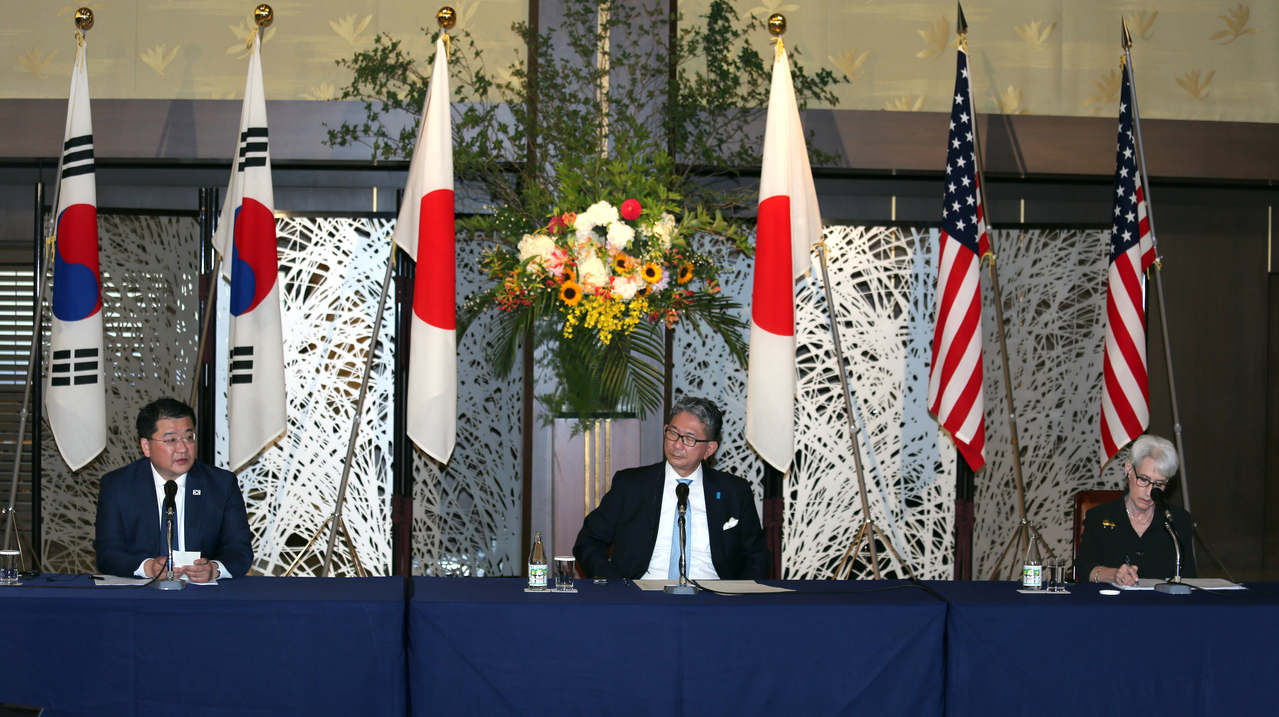US, Japan, South Korea united on North Korea, Taiwan issues: Officials
Sign up now: Get insights on Asia's fast-moving developments

This is the nations' first trilateral vice-foreign ministerial consultations in four years.
PHOTO: EPA-EFE
Follow topic:
TOKYO - The United States and its two East Asian allies Japan and South Korea on Wednesday (July 21) discussed stability in the Taiwan Strait and the denuclearisation of North Korea, stressing their policy alignment even amid frayed relations between Tokyo and Seoul.
In their first trilateral vice-foreign ministerial consultations in four years, the three countries said they "stood shoulder to shoulder" in their strategic coordination in the Indo-Pacific and over North Korea.
"When countries take actions that run counter to the United States' interests or that threaten our partners and allies, we will not let those challenges go unanswered," US Deputy Secretary of State Wendy Sherman said in Tokyo.
Japan has been taking an increasingly tough stance on Taiwan, angering China. This month, it warned of the need for a "sense of crisis" over the Taiwan Strait in its annual defence white paper, while Deputy Prime Minister Taro Aso said that Japan should defend Taiwan in case of a Chinese attack as this poses an "existential threat" to Japan's security.
The State Department said on Wednesday that Ms Sherman will, after visiting South Korea and Mongolia as planned, travel to China from July 25 to 26 and then to Oman on July 27.
She will meet Chinese officials, including Foreign Minister Wang Yi. The State Department said that the US looks forward to candid exchanges "to advance US interests and values and to responsibly manage the (US-China) relationship".
At the trilateral meeting, North Korea's denuclearisation was also high on the agenda.
While US President Joe Biden has indicated Washington's openness for dialogue with Pyongyang, the three diplomats agreed on the need for patience.
Japan's vice-foreign minister Takeo Mori said that it was impossible to predict North Korea's next move, while his South Korean counterpart Choi Jung-kun stressed that it was a "long game".
Dr Choi said: "We shouldn't be too hasty."
North Korea has thus far rebuffed American entreaties, to which Ms Sherman said: "We must exercise some patience - perhaps not too much but some."
"We all have to understand that North Korea is also struggling with the pandemic - as is the entire world - and has to live with the United Nations Security Council resolutions and the sanctions that come with it," she said.
"But we hope that they understand that a brighter future comes from engaging in these discussions around the denuclearisation of the Korean Peninsula."
North Korea said this year in a report to the UN that it was facing its worst food crisis in more than a decade. Adding to the odds of a prolonged famine or drought, the state-run Korean Central News Agency reported on Tuesday of a "fierce" heatwave that is being tackled by the State Emergency Disaster Committee.
Still, the united trilateral front must overcome icy ties between Japan and South Korea.
South Korea's Presidential Blue House said on Monday that President Moon Jae-in will not visit Japan for the opening ceremony of Tokyo Olympics on Friday.
The latest setback came after Mr Hirohisa Soma, the deputy chief of mission at the Japanese Embassy in Seoul, reportedly ridiculed Mr Moon's attempts to improve bilateral ties as "masturbating with himself".
While the two countries host the bulk of US troops in Asia, this is but the latest rift in bilateral ties that have long been clouded by historical disputes over wartime forced labour and "comfort women" - an euphemism for the estimated 200,000 women who were forced into the sex trade by the Japanese military during World War II.
Tokyo has blamed Seoul's lax oversight on materials with potential for military use in striking off South Korea from its "whitelist" of trusted countries with preferential export controls. This prompted Seoul to threaten to pull out of a trilateral military intelligence-sharing pact with the US and Japan.
Mr Mori and Dr Choi on Wednesday agreed on the need to restore bilateral ties to a "healthy and sound state", vowing to continue talks at the working diplomatic level.
Dr Choi and Ms Sherman also wished Japan's success in organising the Tokyo 2020 Olympic Games.

